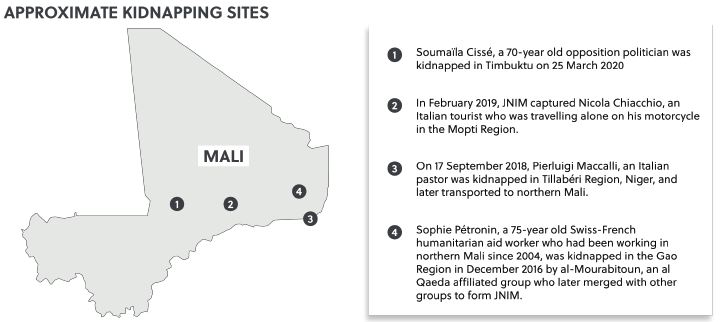Snatched in the Sahel: Militant kidnappings in Mali
MALI KIDNAPPING
Kidnapping remains a lucrative business for terrorist groups such as Jama’at Nasr al-Islam wal Muslimin (JNIM), and other groups who operate in Mali and the wider Sahel region. On 8 October, the new Mali government, instated after a coup in August, released 204 alleged and convicted JNIM fighters and paid a ransom of approximately EUR 10 million (USD 11,8 million) to secure the release of four hostages. The released kidnap victims include Soumaïla Cissé, leader of the Union pour la République et la Démocratie (Union for the Republic and Democracy, URD) opposition party, a French-Swiss humanitarian aid worker, and two Italian nationals, all of whom were kidnapped between 2016 and 2020.
Cissé, the most recent high-profile kidnap victim is a former Malian minister, and was kidnapped in the town of Saraféré, Timbuktu Region on 25 March 2020 while he was campaigning ahead of the legislative election. Katbat Macina, the JNIM offshoot which operates in the region conducted the kidnapping. Although these groups had previously kidnapped low-profile local politicians, it was the first time that JNIM had kidnapped a high-profile politician such as Cissé. The circumstances surrounding his kidnap indicate that it was not an opportunistic attack, but rather that it was targeted and well organised. Since the early 2000s, groups in the Sahel have almost exclusively targeted foreign nationals, aid workers, and employees of multinational companies operating in the region.
JNIM have developed specific guidelines relating to the treatment and transportation of abductees. They are also willing to execute their prisoners in cases of escape attempts, failed negotiations for prisoner exchange, and in response to government-led operations to rescue hostages.
NEGOTIATIONS, FEES, AND TACTICS
The Malian government negotiated with JNIM through various intermediaries. The ransom fees increased from EUR 2 million (USD 2,3 million) to EUR 10 million and the number of prisoners to be released similarly increased from 30 to 204 after the French and Italian governments insisted that the Malian government secure the release of the foreign nationals in addition to Cissé. The increase in ransom demand highlights the high value of foreign nationals during negotiations.
Ransoms paid for abductees provide a significant source of income for groups operating in the Sahel region. Typical ransom fees for a foreign national can range between USD 4 to 10 million per person in the northern Mali region. The ransom fees for local nationals are substantially lower, as kidnapping is instead used as a tactic in destabilising local power structures and instilling fear into local communities. Since 2017 JNIM has reportedly earned in the region of USD 40 million in ransom fees.
RELEASED FIGHTERS
The number of prisoners released by the Malian government is unprecedented. The prisoners released include members who are responsible for high-profile attacks in Mali, Burkina Faso, and Côte d’Ivoire. The release of these prisoners bolsters JNIM at a critical time. JNIM – aligned with al Qaeda – is currently clashing with the Islamic State in the Greater Sahara (ISGS) terrorist group – aligned with Islamic State – whilst simultaneously facing an aggressive counterterrorism campaign led by France and its regional partners in the Sahel. Although the large number of prisoners will strengthen the fighting numbers of the group, the high-profile status of many of the released prisoners will benefit JNIM more in terms of their local and political influence in the northern region. JNIM will therefore be able to reassert its control in areas where it is currently being challenged by ISGS, and subsequently maintain control of the kidnapping and trafficking networks in the area.

THE THREAT REMAINS
JNIM have developed specific guidelines relating to the treatment and transportation of abductees. They are also willing to execute their prisoners in cases of escape attempts, failed negotiations for prisoner exchange, and in response to government-led operations to rescue hostages. The high risk of a failed rescue attempt therefore disincentivises governments from conducting military operations to secure hostages. The high value of foreign nationals incentivises JNIM not only to continue kidnapping foreign nationals, but to hold onto their hostages for extended periods to use as strategic bargaining chips to acquire various concessions.
Amid a persistently fragile security environment, foreign nationals remain at risk and present an attractive target for terrorist and kidnapping groups operating in the Sahel region.
